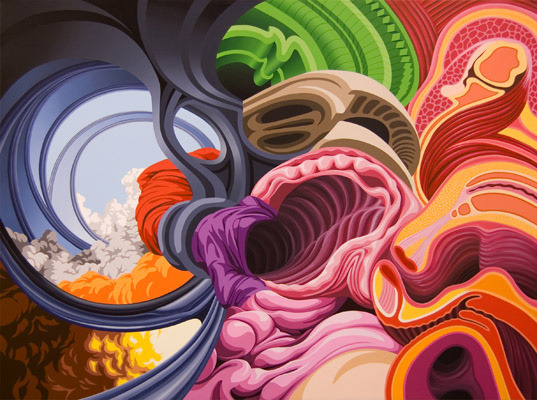
In a world torn apart by religious and ideological conflict, it's easy to see why people are quick to claim that they are spiritual but not religious, or more paradoxically, Christian but not religious. Christianity is a religion, and fully functions as a religious order when it demands either affirmation of certain propositions or conformity to a spiritual path. It seems quite obvious here that Christianity is a religion by definition. But perhaps there is a self-deconstructive nugget of religious criticism present in Christianity, one with the potential to eventually overturn religion altogether one day. This is what I want to explore at present.
In the doctrine of the incarnation, Jesus as icon of God symbolizes a self-restriction on God's part culminating in the crucifixion and confirmed in resurrection. This resurrection ultimately leaves behind not the permanent fleshly body of the rabbi from Nazareth but the mystical body of Christ, the divine body and temple of God's presence on earth birthed in Eucharistic immanence. The human community thus becomes the ultra-particular locale of God on earth, eradicating the holy of holies in the heart of the temple in Jewish tradition. We become the ark of the covenant, the presence of the Holy Mystery. Thus transcendent, universal Being empties itself out (whether in a primordially symbolic or historically ontic sense I cannot say) into the fluid structure of universal Becoming as an immanent Presence mediated through interpretive structures in human experience.
Thus the end of the supernatural-moral-metaphysical God finds historical inauguration in the crucifixion, and the immanent-evolutionary-panentheistic God emerges in resurrection in our very flesh. This is the Christ-event.
For this reason God becomes most present not in triumphalistic power structures of authoritarian dogmatism or militant coercion but defenseless orphans, friendless widows, and ostracized minorities. God is not found among the religious elite but their victims, regardless of identity.
In fact, since God cannot be kept out of humanity locked in a transcendental structure of blind abstract universal interpretation, God cannot be kept exclusively on the side of one singular culturally-constructed identity. Thus, identities crumble and God becomes present behind all identities and interpretations, in the simple ontic facts of human existence and suffering.
Jesus claimed that he brought a sword which would tear families apart. The family was the central tribal identity in his culture -- not the nuclear family of the West but the patriarchal model of Middle-Eastern life (neither of which represent any sort of permanence in history). Jesus was inviting people into the simple reality of a universal human family of one blood -- that of the human race. "In Christ" they would realize their commonality in one blood - Christ's blood. This is not magical. Christ stands in as a representative of primordial humanity outside of any roles projected onto to him, not because this "identity" can be posited as a distinctive cultural role but the very opposite -- he is the negation of all identities that might have fallen on him during that time. Sure, he is like a prophet, but no regular prophet. Like a king, but no ordinary king. He is crucified outside the city walls over the valley of Gehenna -- a cultural symbol of identity-negation. Thus, "in Christ" identities are crucified and "new creatures" are born into one universal family beyond singular identity. This is why for Paul there are no biological, policial, or religious boundaries "in Christ," epitomized in his erasure of the "male and female" binary (biological), the "slave and free" binary (political), and the "Jew and Greek" binary (religious).
In this sense, Christianity invites us beyond religion, beyond itself, into the Holy Mystery and Presence which encompasses every particle of matter without selling itself out to conceptual interpretations but flowing through them as a life-giving force and empowerment of human beings in relation to each other.
so be it!
ReplyDelete